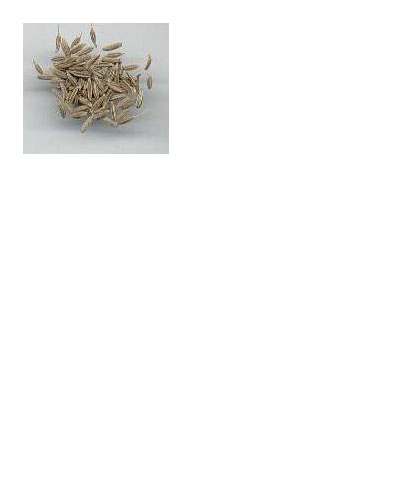Zeera
Latin: Cuminum Cyminum
Therapeutic Action:
Cuminum cyminum Therapeutic properties The therapeutic properties of cumin oil are antiseptic, anti-spasmodic, antitoxic, bactericidal, carminative, digestive, diuretic, emmenagogue, nervine, stimulant and tonic. Uses Cumin is useful as a warming oil and helps relieve muscular pains and osteoarthritis. In the digestive system, it is a stimulant that helps with colic, dyspepsia, flatulence, bloating and indigestion. For the nervous system, it is a tonic and has a beneficial effect on headaches, migraine and nervous exhaustion. The following ways you can use Cumin in your homes and communities; After Fever; The seeds taken with jaggery improves digestion and flushes toxins out through the urine. Also relieves burning. Diarrhoea and Indigestion; The seeds are given with curd. Syphilis and Urinary Infections; The following preparation is taken. 4 parts of Jeera, 2 parts of Khunkharala, 5 parts of Kalmishora, 5 parts of Dhaniya and 2 parts of Gulab (rose). Burning and Frequent Urination: Add 5 grams (1 teaspoon) to 1 glass of water and boil. Dosage; 3-5 cups should be consumed daily. For prevention; add a few seeds in a glass of boiled water, drink one glass a day. Difficult Delivery/Labour: The seeds are taken. They also increase lactation after delivery. Stomach Pain: Roast the seeds, add during preparation of food. Irregular Menstruation: The seeds are taken. Application of the seeds and water brings relief of pain in piles, breasts, testicles and abdomen. Scorpion Bites; Crushed seeds are applied with ghee and honey and salt. Skin Disorders; Relief can be brought about with application of oil treated with the seeds. Medicinal Uses Antibacterial; Antispasmodic; Aphrodisiac; Carminative; Galactogogue; Poultice; Stimulant; Stomachic. Cumin is an aromatic, astringent herb that benefits the digestive system and acts as a stimulant to the sexual organs[238]. It has been used in the treatment of minor digestive complaints, chest conditions and coughs, as a pain killer and to treat rotten teeth[238, 254]. Cumin is seldom used in Western herbal medicine, having been superseded by caraway which has similar properties but a more pleasant flavour[4]. It is still widely used in India, however[4] where it is said to promote the assimilation of other herbs and to improve liver function[238]. The seed is antispasmodic, carminative, galactogogue, stimulant and stomachic[4, 46, 240, 254]. A general tonic to the whole digestive system, it is used in the treatment of flatulence and bloating, reducing intestinal gas and relaxing the gut as a whole[254]. In India it is also used in the treatment of insomnia, colds and fevers and to improve milk production in nursing mothers[254]. Ground into a powder and mixed into a paste with onion juice, it has been applied to scorpion stings[254]. The herb has been used externally as a poultice to relieve stitch and pains in the side[244]. The essential oil obtained from the seed is antibacterial and larvicidal[238].
References:
- Nadkarni, Vol I, P 408-410
- Leung & Foster P-201-02
Used in:
- Gastrox Tablets
- Panchlavan Tablets
- Unexozim Forte Capsule
- Amton Drops / Calciton Syrup / Calciton With Iron Syrup

Copyright 2013 Unexo Laboratories Pvt. Ltd. All Rights Reserved. Designed & Developed By: Credence Technologies


